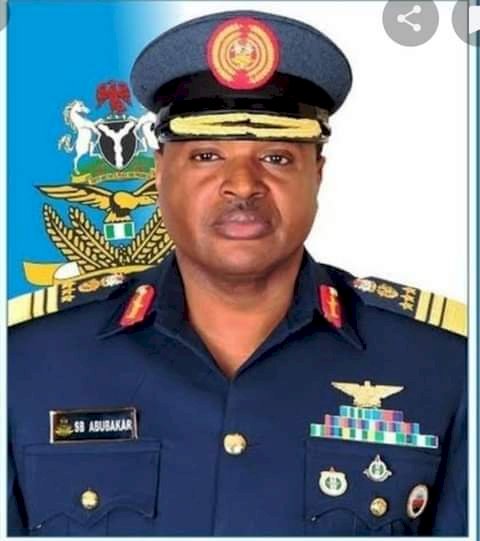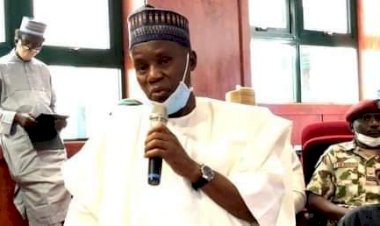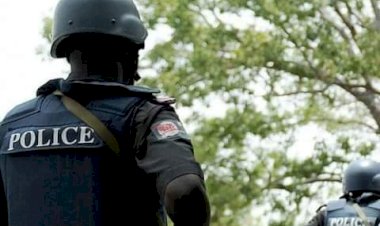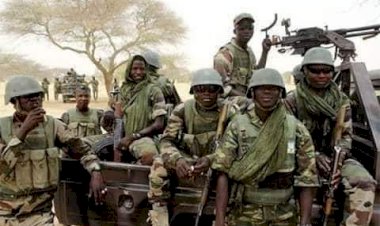Air Marshal Sadique Abubakar: Building NAF Of The 21st Century

By Tarkaa David
Tarkaa David in this report, looks at the resilient leader who, in the last five years has transformed the Nigerian Air Force.
Air Marshal Sadique Baba Abubakar, is the 20th Chief of the Air Staff. Since he assumed duty; superintending over the Nigerian Air Force (NAF) and the NAF Reserve, he has continued to transform and reposition the Service for prospects.
Air Marshal Abubakar, who was born in Azare, Bauchi State, joined the NAF as a member of the Cadet Military Training Course (CMTC 5). He holds an MSc in Strategic Studies from the University of Ibadan, a BSc in Political Science (Second Class Upper Division), and a Diploma in Public Administration.
The CAS completed; Primary Flying Training Course, Basic Flying Training Course, Mi-35p Helicopter gunship Tactical Type Rating Course, Mi-17 Type Rating Course, Junior Division (JD) Course 33, Senior Staff (SD) Course, National War College (National Defence College), and holds Commercial Pilot License (Helicopters) with Instrument Rating.
He has held the following appointments: Commander Nigerian Air Force Station Maiduguri, Commanding Officer 207 Wing, Acting Commanding Officer, National Emergency Management Agency Air Wing, Commander 97 Special Operations Group (now 115 Special Operations Group) Port Harcourt, Air Component Commander OPERATION RESTORE HOPE and Air Officer Commanding Training Command (now Air Training Command), Kaduna.
Air Marshal Abubakar has flown the following aircraft; Bulldog, Piper Warrior, Enstrom, Bell 206, BO-105, Mi-17, and Mi-35P helicopters. The CAS, as training Captain, has accumulated over 2,500 operational and instructional flying hours.
Some of his major awards and decorations include; Best Cadet in Flying at Primary Flying Training Wing in 1981, Best All Round Cadet at Primary Flying Training Wing in 1981, Tactical Air Command Best Officer of the Year in 1997, Chief of the Air Staff’s Letter of Commendation for good leadership and prudent management of resources by Air Marshal OO Petinrin in 2009, Chief of the Air Staff’s Letter of Commendation for good leadership and prudent management of resources by Air Marshal MD Umar in 2011, Chief of the Air Staff’s Special Award from Air Marshal AS Badeh in 2013, Distinguished Flying Star (DFS), General Service Star (GSS), Passed Staff Course Dagger psc(+), Distinguished Fellow of the National Defence College fdc(+) and Distinguished Alumni of National Defence College.
Air Marshal Sadique Abubakar, who is happily married with children, enjoys reading and walking.
Following his appointment in July 2015 by President Muhammadu Buhari, the narrative of the NAF has continued to change positively, particularly as the Administration focuses on securing the country and making it more conducive for citizens to go about their daily activities without any form of fear.
Air Marshal Abubakar came on board with the Vision of “repositioning the NAF into a highly professional and disciplined force through capacity building initiatives for effective, efficient and timely employment of air power in response to Nigeria’s national security imperatives”.
Keeping faith with this Vision, the NAF, under his watch, has recorded remarkable achievements in the fight against terrorism and other forms of criminality in the country. This has been greatly facilitated by the acquisition of new platforms and reactivation of existing ones as well as unprecedented infrastructural development in NAF units across the Country.
The NAF has also witnessed enhanced professionalism through the expansion of its organizational structure and augmentation of its manpower strength. Tremendous progress has also been made in the areas of human capacity development, enhancement of personnel welfare as well as Research and Development (R&D) to meet the fluid security needs.
The war against insurgency had defied all strategies prior to the coming on board of the Administration of President Muhammadu Buhari in 2015. The security situation in the Country was quite dire that the Boko Haram attacks spread beyond the Northeast even up to Abuja, where the United Nations Building was attacked by suicide bombers.
As at early 2015, the BH Sect was in control of over 20 Local Government Areas in the Northeastern part of the country. However, the combined efforts of the Armed Forces, supported by other security agencies, have resulted in the liberation of virtually all of these territories from the Sect. The activities of the Sect are now mainly limited to the fringes of Lake Chad and parts of Sambisa and Alagarno Forests.
This has necessitated the return of many erstwhile displaced persons to their ancestral homes, as peace returned to the hitherto war-torn areas just as the State Government has also initiated a resettlement programme. As part of the ongoing efforts in this regard, the NAF has conducted several missions to project Air Power in support of Operation LAFIYA DOLE, the flagship of the Nation’s Counter-Insurgency (COIN) campaign.
Moreover, besides supporting the joint operations, the NAF has also conducted independent operations to destroy the insurgents’ capabilities before they can be brought to bear on their forces. Some of these independent operations include Operation RUWAN WUTA I – IV, Operation THUNDER STRIKE I and II, Operation GREEN SWEEP I to III, Operation RATTLE SNAKE I to III as well as Operation DECISIVE EDGE, Operation LONG REACH I and II; and more recently, Operation HAIL STORM I and II.
In the fight against armed banditry in the Northwest, the NAF has deployed personnel along with air assets as part of the Defence Headquarters (DHQ) Operation HADARIN DAJI and the newly launched Operation ACCORD. It had also conducted dedicated airstrikes against identified armed bandit locations under the auspices of Operation DIRAN MIKIYA in 2018/2019.
The NAF also has Special Forces elements that are fighting side by side with other Services and security agencies in the various Theatres of Operation. Furthermore, in conjunction with other security agencies, the NAF has continued to provide close air support, air interdiction, in-Theatre liaison flights, medical and casualty evacuation as well as logistics re-supply.
In realization of the need to silence the gun and win the heart and minds of the people, civil-military relations has occupied a strategic position in the scheme of modern warfare. Since the outbreak of the novel Coronavirus (COVID-19) the NAF has airlifted several Government officials, equipment and medical supplies in response to the outbreak, while NAF medical doctors, nurses and other health workers were also mobilized as part of the 80 selected Armed Forces of Nigeria medical personnel deployed to support the Federal Government’s effort to deal with COVID-19 in Nigeria.
The Service also ensured that its Liquefied Oxygen (LOX) plant is on a 24-hour operation to ensure uninterrupted production and supply to Isolation Centers across the country, while 40 medical personnel were trained for the Aeromedical Evacuation of critical case patients of COVID-19 with the C-130 Hercules aircraft, which was configured for that purpose. Additionally, in line with Mr President’s mandate to contribute towards winning the peace in troubled areas in the Country, the NAF has emplaced programmes aimed at alleviating the sufferings of IDPs as well as win the hearts and minds of those affected by the activities of BHTs and other criminal activities.
In this regard, the NAF established a Level 2 Hospital each at Bama and Dalori, Borno State. The NAF also initiated a school feeding programme for 1,000 school children in the 2 IDP Camps. This has greatly contributed to the number of pupils that have returned to school in the area. Besides, the NAF distributed ‘Dignity Packs’ containing a complete package of sanitary items, to young girls in the IDP Camps. Similarly, in a bid to strengthen better civil-military relations with host communities, the NAF has continued to conduct medical outreaches all over the country and has so far treated over 400,000 people in different parts of the country in the last 5 years. Also recently, as part of its civil-military relations efforts, the NAF airlifted conjoined twins along with their parents and the medical team back to Yenagoa after a successful separation surgery at the Federal Medical Centre, Yola.
Additionally, pursuant to its constitutional role of providing Military Aid to Civil Authority, the NAF most recently airlifted over 120,000 Kg of humanitarian relief items provided by President Muhammadu Buhari for IDPs in Borno State using the C-130H aircraft and helicopters.
Besides dealing with internal threats, the NAF has also projected Air Power beyond the shores of Nigeria. For instance, NAF Alpha Jets were the first and only fighter aircraft deployed in the Gambia to actualize the mandate of the Gambian people and facilitate the peaceful handover of political power to President Adama Barrow in 2017.
The C- 130s, flying the Nigerian flag, also transported humanitarian relief materials to the Sierra Leonean people after the unfortunate mudslides that affected that country in August 2017. The Nigerian Air Force on 22 August, 2019 airlifted back to the Country about 133 Nigerians who took refuge in neighbouring Cameroon.
The returnees were airlifted with a NAF C-130H aircraft from the Moroua Salak International Airport in Cameroon’s Northern Region to Yola International Airport. This was in furtherance of NAF’s constitutional role of providing Military Aid to Civil Authority. Also, the NAF airlifted relief materials to Malawi, Mozambique and Zimbabwe to assist the victims of the massive flooding that affected some communities in those countries in April 2019. NAF C-130H aircraft were also employed to airlift the West African Health Organization (WAHO)-donated COVID-19 medical supplies in a massive airlift operation to 13 West African countries.
The NAF under the leadership of Air Marshal Sadique Abubakar has in the last 5 years witnessed a tremendous boost to its aircraft holdings across various fleets, through systematic acquisition and reactivation of platforms. The Service acquired 22 brand new aircraft to boost training and combat readiness of the NAF. These include 10 Super Mushshak trainer aircraft, 5 new Mi-35M helicopter gunships, 2 Bell 412 helicopters and 4 Agusta 109 Power attack helicopters and a Mi-171E helicopter.
Besides these, 17 additional aircraft have also been ordered by the Federal Government, which include 12 Super Tucano attack aircraft, 3 JF-17 Thunder multi-role fighter aircraft, an additional Mi-171E helicopter and a special mission aircraft for the Federal Government’s Deep Blue Project. In the same vein, 20 previously grounded aircraft have been reactivated. Indeed, for the first time in its history, the NAF successfully conducted multiple in-country Periodic Depot Maintenance (PDM) of its platforms such as two C-130H (NAF 917 and 913) in Lagos and three L-39ZA aircraft in Kano, two Mi-35P in Port Harcourt as well as three Alpha Jet aircraft in Kainji, which also involved avionics upgrade.
The acquisitions and reactivation as well as the emplacement of robust logistics support structure have enabled the NAF to raise the serviceability status of operable aircraft from about 35 per cent in 2015 to between 78 and 82 per cent at the moment.
The NAF has also expanded its force structure by creating 2 new branches, 2 new Field Commands as well as several new units including some Quick Response Groups and Wings (QRGs/QRWs), to bring security closer to the people of Nigeria. The 2 new Commands are the Special Operations Command which is located in Bauchi and the Ground Training Command which is located in Enugu. The QRGs/QRWs and Regiment Groups, which are manned by NAF Regiment and Special Forces personnel, are located in Gembu, Taraba State; Ipetu Ijesha, Osun State; Owerri, Imo State and Agatu, Benue State. Other locations where the NAF established new units include Kerang, Plateau State; Kastina, Katsina State; Gombe, Gombe State; Gusau, Zamfara State; Lafia in Nassarawa State as well as Birnin Gwari in Kaduna State.
To boost personnel welfare, the NAF has established Reference Hospitals in Daura and Bauchi while also upgrading medical equipment at its various medical Centres around the country, with new Cancer Screening Centres established in Bauchi, Kaduna, Maiduguri and Makurdi. The NAF medical facility in Port Harcourt was also upgraded to a Reference Hospital. Moreover, in the last 5 years, the NAF has renovated/remodeled and constructed new blocks of classrooms and hostel accommodations in existing NAF schools across NAF units while establishing 2 new secondary schools namely Air Force Girls Comprehensive School Abuja and the Air Force Secondary School (AFSS) Shasha, Lagos. AFSS Kaduna was also upgraded to a boarding school and renamed Air Force Comprehensive School Kaduna. In addition, the NAF, through massive construction of residential accommodation, has been able to raise accommodation sufficiency from 35 to about 72 per cent, despite almost doubling the strength of its personnel in the last 5 years. In all, the NAF has executed over 900 infrastructural projects including office and residential accommodations, messes and recreational facilities as well as schools and hospitals, amongst others.
The NAF has also invested greatly in R&D so as to develop an unprecedented capacity to surmount current and emerging security challenges. Some of the R&D breakthroughs recorded include the production of the first NAF indigenous operational Unmanned Aerial Vehicle (UAV), named Tsaigumi, which was inducted into the NAF by President Mohammadu Buhari in February 2018. The NAF also received patent rights for the production of the Unmanned Ground Vehicle and hydraulic accumulator diaphragm for Mi-series helicopters. The Service also weaponized several platforms, designed/produced a test bench for the Alpha Jet anti-skid system and produced 30.1mm rocket launcher/rockets, amongst other R&D feats. Additionally, as part of the drive to provide indigenous solutions to tackle the COVID- 19 Pandemic, the NAF recently unveiled 2 emergency ventilators produced by a team of NAF researchers along with some partners.
There is no doubt that the NAF, under Air Marshal Abubakar, has remained “Willing, Able and Ready” to employ air power effectively, efficiently and in a timely manner to deal with the security challenges facing Nigeria, in order to ensure the security of the Nation and its people.
- Written by Tarkaa David via Leadership Newspaper
18th October, 2020.


















































